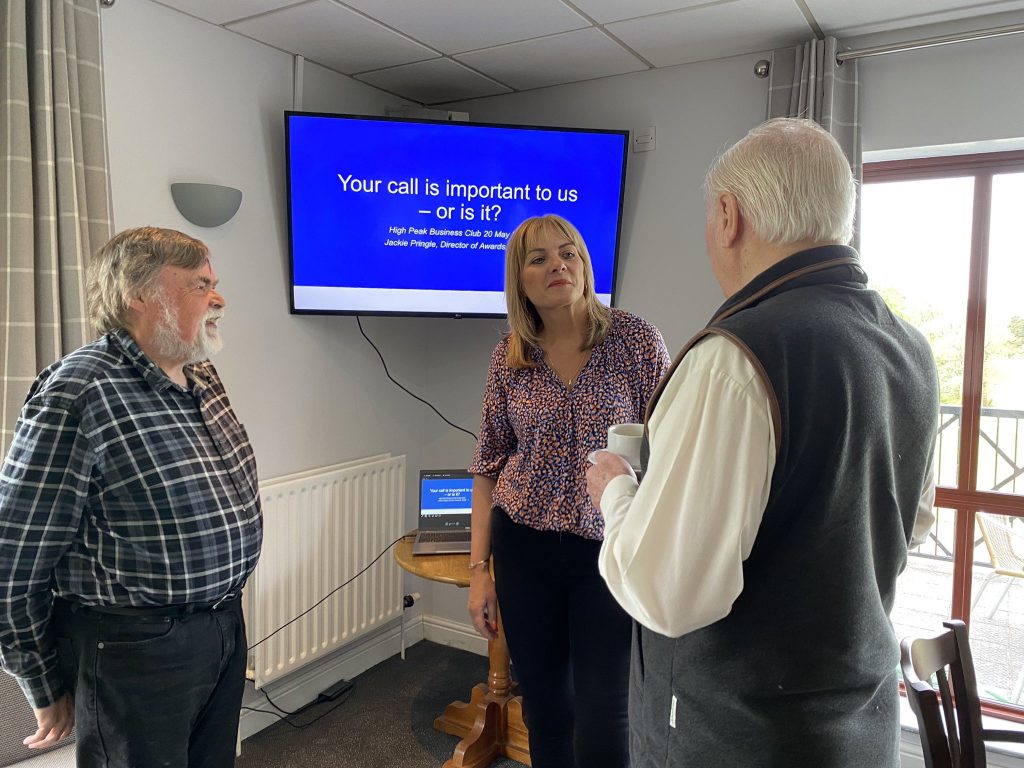JACKIE PRINGLE – Director of Awards 20 May 2022
Call centres – we all use them, we all get frustrated by them, we don’t notice when they are working well, and we have no idea what goes on behind the scenes. They are ubiquitous in modern life, yet we realised, listening to the remarkable Jackie Pringle, that they comprise some of the most innovative and creative businesses we have in the UK and Europe.
Jackie says she “fell into” working in a call centre for the AA when her children were small; like many employees she found the shift working pattern suited her. She also enjoyed helping people, particularly in an emergency as often happened with AA members, and won “AA Call Handler of the Year” in 1998. Soon she was a team manager, then Quality Manager: that required “doing it from scratch” in the days when no templates existed, asking, “What does ‘good’ look like?”

Unfortunately, the effort which quality requires is not always appreciated; when money is tight, employers will look to cut costs… she was made redundant. The same thing happened again later when she was working for Co-op Insurance; but that experience had helped her have a “helicopter view” of the vast empire of everything the Co-op was then engaged in.
At that point the industry’s trade association CCMA beckoned, with its hundreds of constituent members. The helicopter view has continued, as she now runs their award programmes.
Nearly 6,000 contact centres operate in the UK alone employing around 800,000 people – that’s about 4% of the entire UK workforce. The outsourcing industry, companies such as Capita, account for 240,000 themselves. The public sector is a big part, and grew dramatically during the pandemic with NHS 111, Covid helplines and Test & Trace. That required rapidly switching call centre staff around, but then phones went quiet in some call centres – nobody was phoning for car insurance.
Every organisation has a call centre, Jackie pointed out. Some will run their own call centres, some will outsource the service to professionals; some do a mixture of the two. The same principles apply: call handlers need to be friendly, helpful, and respectful. But behind them is a huge team, including but not limited to ferocious IT development, constantly updated websites, training with product developers, authentication processes, quality control, feedback and complaints, HR and resource management to match demand at peak times with staff hours… the range is astonishing.
Patterns of need surge or die in the most dramatic ways at times, and contact centres have to keep up. During Covid lockdown people were at home and wanted to chat, so the average contact time increased in many sectors. But the pandemic changed how the centres work too, and that had to be done virtually overnight. Five years ago homeworking was unusual so it was innovative to have an award for a “distributed workforce” (some in the contact centre, some at home). Now there’s no need for such an award category as everyone does it – but it involved a mad scramble in spring 2020 to get thousands of laptops, headsets and other paraphernalia into call handlers’ homes, and ensure IT and quality control kept up. Evolution is constant with webchats an increasing part, and telephony predicted to decline to 61% of all contact by 2025.
The CCMA sounds a very busy place in itself, offering a wide range of conferences and training programmes, with forthcoming sessions on “Effective Performance Management” to “Mental Health Awareness for Contact Centre Managers” and “How To Reduce Customer Effort” (we’d all like to know that). Online seminars, benchmarking, visits to other call centres… I couldn’t help thinking that this is a model trade association, this is how it should be done.
The pinnacle of all this effort is the Awards programmes, which culminates in two glamorous annual dinners with star presenters such as Vernon Kay and Fiona Bruce and “legends” like Sir Steve Redgrave, Frank Bruno and Sir Ranulph Fiennes. One is for the UK, and the other for in Europe (26 countries last year) – that’s the ECCCSAs (European Contact Centre and Customer Service Awards). The awards have different approaches, Jackie explained, with the UK’s 30 or so categories being mainly employee-based (Best Complaints Manager, Best Team Leader), and the ECCCSAs company-wide (Best Customer Engagement, Best Crisis Management, Most Effective Deployment of AI..). But both are massive, with the UK National Contcts Centre Awards dinner in Billingsgate on 20th June. “That’s 1,100-plus guests with dietary requirements..” said Jackie. And it’s already sold.
She describes herself as a project manager running two, six month programmes with some overlap. The role involves reviewing the categories every year, marketing, organising the shortlisting, arranging visits by teams of judges (all give their time free), liaising with sponsors (avoiding conflicts of interest), organising the dinners themselves – including testing every morsel and wine choice! During lockdown the ceremonies had to be done virtually, and that got an award itself.
Like so many in this underrated industry, she works phenomenally hard. I was left with the feeling that such excellence does not come by accident, and that perhaps we should not take it so much for granted. “Your Call is Important to Us – But is it?” was the talk title I gave her. “Yes, it is,” was her firm reply.
